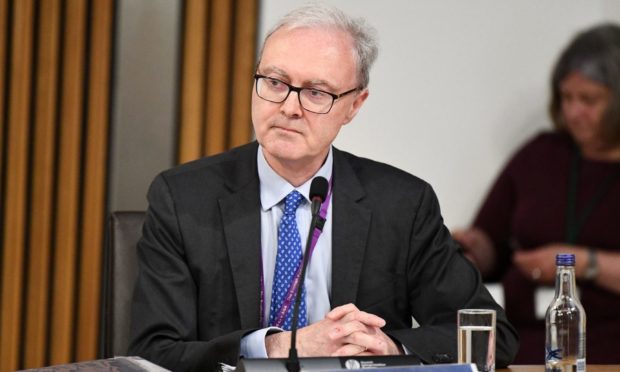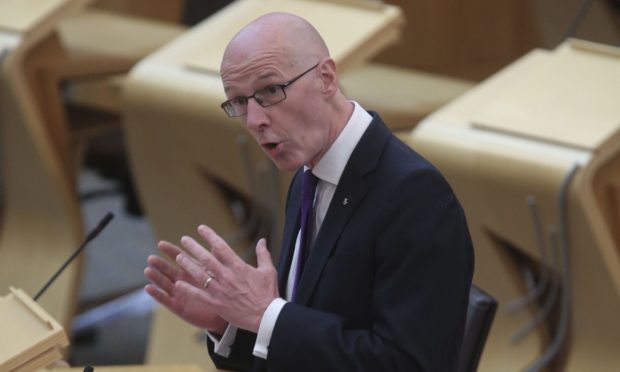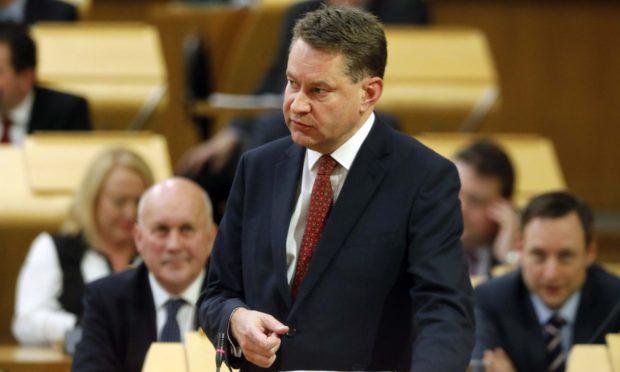Scotland’s most senior law officer, Lord Advocate James Wolffe QC, is to be quizzed on who is blocking the handover of crucial legal documents to the Salmond inquiry.
When Mr Wolffe gives evidence to MSPs in a few hours’ time, the long-running controversy over the lack of documentation being made available to the inquiry will be raised again.
MSPs had imposed a deadline of Friday last week for the Scottish Government to hand over the legal advice it received before Alex Salmond won a high-profile civil case against the administration he used to lead.
The legal advice relates to the Scottish Government’s decision to contest Mr Salmond’s legal challenge to its internal investigation into claims of sexual harassment made by two women.
The internal process was later ruled unlawful by the Court of Session, a decision that led to the Scottish Government shelling out more than £500,000 for Mr Salmond’s legal costs.
The MSPs believe the legal advice is key to understanding why the Scottish Government’s internal anti-harassment process was successfully challenged.
A majority of MSPs have voted in favour of the advice being handed over to the parliament committee. But despite the vote establishing that the will of the Scottish Parliament is for the information to be disclosed, the Scottish Government has yet to give it to the inquiry.
Need for ‘compelling reasons’
As Friday’s deadline approached, Deputy First Minister John Swinney wrote to the committee to tell MSPs that no decision had been taken on the issue yet. Ministers have argued that the information is subject to legal privilege and should remain private.
In his letter to the committee, Mr Swinney said that “even if ministers take the decision that the balance of public interest favours disclosure in a particular case, they must obtain the prior consent of law officers and that consent will be given only if there are ‘compelling reasons'”.
Conservative MSP Murdo Fraser, who sits on the Salmond inquiry, said: “This evidence session must shed light on why the government won’t release the legal advice they received for the Alex Salmond judicial review.
“We expect the Lord Advocate to reveal who is blocking the release of the legal advice – Scottish Government ministers or the law officers themselves.
“This shameful episode has cost £500,000 of taxpayers’ money and now the will of parliament is being ignored. The public deserves to know why.”
Ahead of the evidence session, another committee member, Alex Cole-Hamilton, the Lib Dem MSP, said: “It is frustrating that the elephant in the room will be a piece of evidence that we don’t actually have – which is the legal advice.
“It would be a far better use of everybody’s time if we had actually had something tangible to discuss and ask questions about, whereas now much of the meeting will be dancing around why we don’t have it.”
Mr Cole-Hamilton added: “Should any member of the government – be it minister or law officer – decide they are not going to share it with parliament they would be in contempt of parliament and the parliament has the right to exert its supremacy.”
A Scottish Government spokesperson said: “The Deputy First Minister has clearly set out in his letter to the committee the detailed consideration that the government is giving to this issue and also the extensive steps that are being taken to secure the release of further documentation.”
Wait and see approach…
Over the weekend there were reports that MSPs are considering tabling a vote of no confidence in the Lord Advocate or the option of a similar action against Mr Swinney.
Inter-party talks, however, are understood to be at a very early stage with MSPs waiting to see what happens when Mr Wolffe gives evidence to the Salmond inquiry before going any further.
Also giving evidence will be Scotland’s most senior civil servant, Leslie Evans, who appears in front of the committee in person for the third time.
One question Ms Evans, the permanent secretary, is likely to be asked will be about “paragraph 10”, the crucial rule at the heart of Mr Salmond’s successful legal challenge.
The Scottish Government procedure for handling complaints against current and former ministers states in paragraph 10 that the investigating officer “will have had no prior involvement with any aspect of the matter being raised”.
The Scottish Government investigating officer, Judith Mackinnon, who looked into the harassment claims made against Mr Salmond, had prior contact with the former first minister’s accusers.
The prior contact, before the Scottish Government’s investigation began, was fundamental to the process being declared tainted by apparent bias at the conclusion of Mr Salmond’s legal action.
‘Bit of a bombshell moment’
In earlier evidence to the Salmond inquiry, Ms Mackinnon suggested there was not yet sufficient guidance around paragraph 10 to ensure it could not be misinterpreted again.
Mr Cole-Hamilton said: “I’m very keen to follow up with Leslie Evans, in particular, the potential for flawed interpretation of paragraph 10 of the procedure, which is why the case collapsed.
“I want to know why, two years after the collapse of the judicial review, that is still in operation? Is it any wonder that there have been no further complaints raised under that procedure.”
“When I asked Judith Mackinnon about this, it was a bit of a bombshell moment. It seems there is no further guidance behind its application.
“I don’t think for a minute they would make the same mistake but if you are a woman or a man who has been abused by a minister previously then when why on earth would you come forward under that same procedure?”
A Scottish Government spokesperson said: “The permanent secretary commissioned an external review of the procedure in January 2019 to ensure we learn and apply learning to any future complaints.
“The review was put on hold due to the announcement of criminal proceedings against the former First Minister and then by the impact of Covid-19, but it is now under way, led by Laura Dunlop QC.
“In the meantime, issues about the implementation of the procedure have been highlighted from the judicial review process. In the event of the procedure being required, we would be mindful of all areas of potential challenge, including the interpretation of paragraph 10, and would take further legal advice.”



